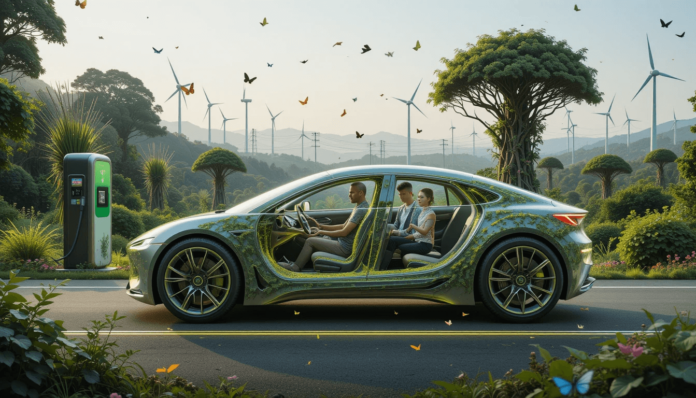
The Carbon-Neutral Car: How Sustainable Materials and Renewable Energy Are Shaping the Future of Automobiles
As the automotive industry moves toward sustainability, the concept of carbon-neutral cars is gaining momentum. With advancements in renewable energy and eco-friendly materials, the future of transportation is becoming greener than ever. But how close are we to truly sustainable automobiles? Let’s explore.
The Shift Towards Carbon-Neutral Vehicles
The transportation sector is one of the largest contributors to greenhouse gas emissions. To combat this, automakers are focusing on:
- Electric and Hydrogen-Powered Vehicles: Reducing reliance on fossil fuels.
- Sustainable Manufacturing: Utilizing recycled and biodegradable materials.
- Renewable Energy Integration: Charging EVs with solar and wind power.
Sustainable Materials in Car Manufacturing
Car manufacturers are incorporating eco-friendly materials to minimize their carbon footprint. Some notable innovations include:
- Bioplastics and Plant-Based Composites: Derived from renewable sources like corn and sugarcane.
- Recycled Aluminum and Steel: Lowering energy consumption in production.
- Natural Fiber Interiors: Bamboo, hemp, and flax for upholstery and dashboards.
- Vegan Leather: Eco-conscious alternatives to traditional leather.
Renewable Energy and Carbon-Neutral Driving
Charging and fueling cars with renewable energy is a game-changer for sustainability. Key developments include:
- Solar-Powered EV Charging Stations: Utilizing solar panels to charge electric vehicles.
- Wind and Hydroelectric Power: Providing clean energy for car manufacturing and operation.
- Hydrogen Fuel Cells: Emitting only water vapor as a byproduct.
Automakers Leading the Green Revolution
Several car manufacturers are at the forefront of the carbon-neutral movement:
1. Tesla
- Pioneering EV technology with solar-powered charging solutions.
- Investing in battery recycling programs.
2. Toyota
- Leading hydrogen fuel cell innovation with the Mirai.
- Utilizing renewable energy in production facilities.
3. BMW
- Committed to using 100% renewable energy by 2030.
- Incorporating natural and recycled materials in vehicle interiors.
Challenges to Achieving Carbon Neutrality
Despite progress, hurdles remain:
- High Initial Costs: Sustainable materials and clean energy infrastructure are still expensive.
- Battery Recycling and Disposal: Addressing the environmental impact of lithium-ion batteries.
- Infrastructure Development: Expanding charging and hydrogen refueling stations globally.
The Road Ahead: A Sustainable Future
The shift towards carbon-neutral cars is inevitable. With continued innovation and investment, we can expect:
- Greater Affordability of EVs and Hydrogen Cars.
- Advancements in Energy Storage and Battery Technology.
- More Sustainable Manufacturing Processes.
Final Thoughts
The dream of a carbon-neutral car is no longer a distant future—it’s happening now. Automakers, governments, and consumers all play a role in accelerating this transition. Are you ready to embrace the future of sustainable driving?
The Carbon-Neutral Car: How Sustainable Materials and Renewable Energy Are Shaping the Future of Automobiles
As the automotive industry moves toward sustainability, the concept of carbon-neutral cars is gaining momentum. With advancements in renewable energy and eco-friendly materials, the future of transportation is becoming greener than ever. But how close are we to truly sustainable automobiles? Let’s explore.
The Shift Towards Carbon-Neutral Vehicles
The transportation sector is one of the largest contributors to greenhouse gas emissions. To combat this, automakers are focusing on:
- Electric and Hydrogen-Powered Vehicles: Reducing reliance on fossil fuels.
- Sustainable Manufacturing: Utilizing recycled and biodegradable materials.
- Renewable Energy Integration: Charging EVs with solar and wind power.
Sustainable Materials in Car Manufacturing
Car manufacturers are incorporating eco-friendly materials to minimize their carbon footprint. Some notable innovations include:
- Bioplastics and Plant-Based Composites: Derived from renewable sources like corn and sugarcane.
- Recycled Aluminum and Steel: Lowering energy consumption in production.
- Natural Fiber Interiors: Bamboo, hemp, and flax for upholstery and dashboards.
- Vegan Leather: Eco-conscious alternatives to traditional leather.
Renewable Energy and Carbon-Neutral Driving
Charging and fueling cars with renewable energy is a game-changer for sustainability. Key developments include:
- Solar-Powered EV Charging Stations: Utilizing solar panels to charge electric vehicles.
- Wind and Hydroelectric Power: Providing clean energy for car manufacturing and operation.
- Hydrogen Fuel Cells: Emitting only water vapor as a byproduct.
Automakers Leading the Green Revolution
Several car manufacturers are at the forefront of the carbon-neutral movement:
1. Tesla
- Pioneering EV technology with solar-powered charging solutions.
- Investing in battery recycling programs.
2. Toyota
- Leading hydrogen fuel cell innovation with the Mirai.
- Utilizing renewable energy in production facilities.
3. BMW
- Committed to using 100% renewable energy by 2030.
- Incorporating natural and recycled materials in vehicle interiors.
Challenges to Achieving Carbon Neutrality
Despite progress, hurdles remain:
- High Initial Costs: Sustainable materials and clean energy infrastructure are still expensive.
- Battery Recycling and Disposal: Addressing the environmental impact of lithium-ion batteries.
- Infrastructure Development: Expanding charging and hydrogen refueling stations globally.
The Road Ahead: A Sustainable Future
The shift towards carbon-neutral cars is inevitable. With continued innovation and investment, we can expect:
- Greater Affordability of EVs and Hydrogen Cars.
- Advancements in Energy Storage and Battery Technology.
- More Sustainable Manufacturing Processes.
Final Thoughts
The dream of a carbon-neutral car is no longer a distant future—it’s happening now. Automakers, governments, and consumers all play a role in accelerating this transition. Are you ready to embrace the future of sustainable driving?
Join the conversation! Share your thoughts on the future of carbon-neutral vehicles in the comments below. 🚗🌱





























